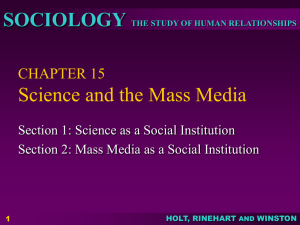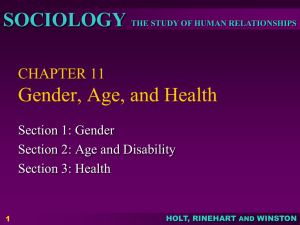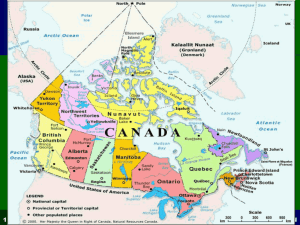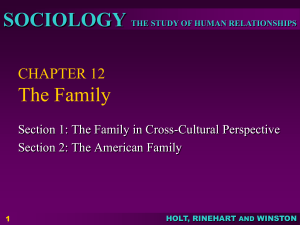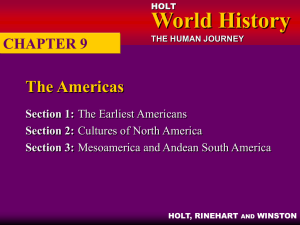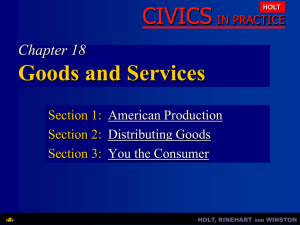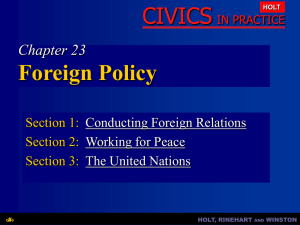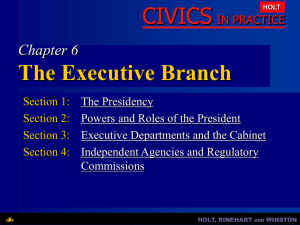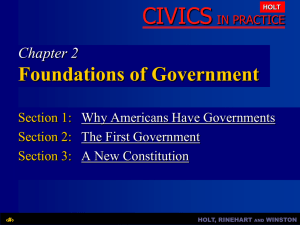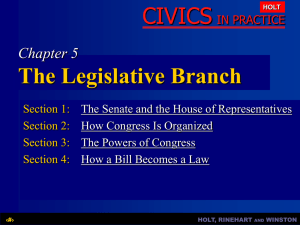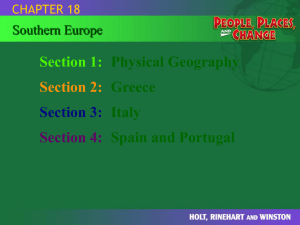Chapter 4: Rights and Responsibilities
advertisement
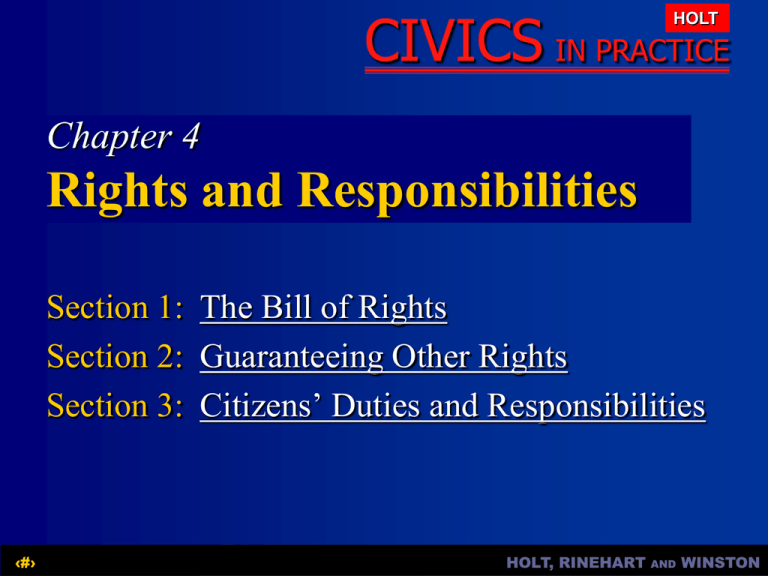
CIVICS IN PRACTICE HOLT Chapter 4 Rights and Responsibilities Section 1: The Bill of Rights Section 2: Guaranteeing Other Rights Section 3: Citizens’ Duties and Responsibilities ‹#› HOLT, RINEHART AND WINSTON CIVICS IN PRACTICE HOLT Section 1: The Bill of Rights The Main Idea The freedoms spelled out in the Bill of Rights—the freedoms of religion, speech, the press, and petition, and the right to a speedy and fair trial—are essential to our democratic system. Reading Focus Why was the Bill of Rights added to the Constitution? How does the First Amendment protect personal freedoms? What other rights does the Bill of Rights guarantee? ‹#› HOLT, RINEHART AND WINSTON CIVICS IN PRACTICE HOLT Section 1: The Bill of Rights A. Adding the Bill of Rights 1. Ratified by states in 1791 2. Controversial document a. Promoted by Jefferson b. Opposed by Alexander Hamilton c. Written/proposed by James Madison 3. First 10 amendments to Constitution ‹#› HOLT, RINEHART AND WINSTON CIVICS IN PRACTICE HOLT Section 1: The Bill of Rights B. First Amendment Rights 1. Freedom of religion a. “Congress can make no law respecting an establishment of religion” b. Madison and Jefferson c. Right to practice d. Separation of Church and state ‹#› HOLT, RINEHART AND WINSTON CIVICS IN PRACTICE HOLT Section 1: The Bill of Rights B. First Amendment Rights 2. Freedom of speech a. “Congress can make no law…abridging the freedom of speech” b. Freedom to express, listen, criticize c. Limits to free speech i. Schneck v. US ‹#› HOLT, RINEHART AND WINSTON CIVICS IN PRACTICE HOLT Section 1: The Bill of Rights B. First Amendment Rights 3. Freedom of the Press a. “Congress shall make no law…abridging the freedom…of the press” b. Colonial time period c. Includes electronic media, books, Internet d. Limitations ‹#› HOLT, RINEHART AND WINSTON CIVICS IN PRACTICE HOLT Section 1: The Bill of Rights B. First Amendment Rights 4. Freedom of assembly a. “Congress shall make no law…abridging the right of the people to assemble” b. Meet peacefully ‹#› HOLT, RINEHART AND WINSTON CIVICS IN PRACTICE HOLT Section 1: The Bill of Rights B. First Amendment Rights 5. Right to petition a. “Congress shall make no law…abridging the right of the people to petition govt for a redress of grievances” b. Right to address concerns c. Right to contact representatives d. Inform representatives of citizens’ wants ‹#› HOLT, RINEHART AND WINSTON CIVICS IN PRACTICE HOLT Section 1: The Bill of Rights C. Other Rights Guaranteed by the Bill of Rights 1. Protecting Citizens a. 2nd Amendment i. Ensure state militia ii. Right to own a firearm b. 3rd Amendment i. Prohibits quartering of soldiers ‹#› HOLT, RINEHART AND WINSTON CIVICS IN PRACTICE HOLT Section 1: The Bill of Rights C. Other Rights Guaranteed by the Bill of Rights 2. Rights of the accused a. 4th Amendment i. Unreasonable search and seizure ii. Search warrants iii. Probable cause ‹#› HOLT, RINEHART AND WINSTON CIVICS IN PRACTICE HOLT Section 1: The Bill of Rights C. Other Rights Guaranteed by the Bill of Rights 2. Rights of the accused b. 5th Amendment i. Protects against hasty govt action ii. Self-incrimination iii. Due process iv. Eminent domain v. Double jeopardy ‹#› HOLT, RINEHART AND WINSTON CIVICS IN PRACTICE HOLT Section 1: The Bill of Rights C. Other Rights Guaranteed by the Bill of Rights 2. Rights of the accused c. 6th Amendment i. Right to prompt trial and jury ii. Right to an attorney ‹#› HOLT, RINEHART AND WINSTON CIVICS IN PRACTICE HOLT Section 1: The Bill of Rights C. Other Rights Guaranteed by the Bill of Rights 2. Rights of the accused d. 7th Amendment i. Right to trial by jury for other cases ‹#› HOLT, RINEHART AND WINSTON CIVICS IN PRACTICE HOLT Section 1: The Bill of Rights C. Other Rights Guaranteed by the Bill of Rights 2. Rights of the accused e. 8th Amendment i. Prohibits cruel and unusual punishment ii. Bail ‹#› HOLT, RINEHART AND WINSTON CIVICS IN PRACTICE HOLT Section 1: The Bill of Rights C. Other Rights Guaranteed by the Bill of Rights 3. Rights of states and citizens a. 9th Amendment i. Have rights not mentioned in C. b. 10th Amendment i. Powers not given to federal govt or forbidden to states belong to states ‹#› HOLT, RINEHART AND WINSTON CIVICS IN PRACTICE HOLT Section 1 Question: What rights are guaranteed by the Bill of Rights? The Bill of Rights ‹#› Separation of church and state The inclusion of rights not specifically listed in the Constitution Freedom of the press Freedom of speech Freedom of petition Freedom of assembly No quartering of soldiers The right to bear arms Protection for those accused Protection from unreasonable search and seizure HOLT, RINEHART AND WINSTON CIVICS IN PRACTICE HOLT Section 2: Guaranteeing Other Rights The Main Idea Other amendments to the Constitution expanded the civil rights of Americans. Reading Focus How did the Thirteenth and Fourteenth Amendments extend civil rights? Which amendments extended Americans’ voting rights? ‹#› HOLT, RINEHART AND WINSTON CIVICS IN PRACTICE HOLT Section 2: Guaranteeing Other Rights A. Civil Rights 1. Civil Rights definition 2. 13th Amendment a. Abolish slavery 3. 14th Amendment a. Full citizenship to African Americans b. Equal protection under the law ‹#› HOLT, RINEHART AND WINSTON CIVICS IN PRACTICE HOLT Section 2: Guaranteeing Other Rights B. Extending Voting Rights 1. Basic principle 2. Voting history 3. Suffrage 4. 15th Amendment a. Right to vote cannot be…race” b. Women? ‹#› HOLT, RINEHART AND WINSTON CIVICS IN PRACTICE HOLT Section 2: Guaranteeing Other Rights B. Extending Voting Rights 5. 17th Amendment a. Direct election of US senators 6. 19th Amendment a. Women gain right to vote 7. 23rd Amendment a. Gave citizens in DC right to vote ‹#› HOLT, RINEHART AND WINSTON CIVICS IN PRACTICE HOLT Section 2: Guaranteeing Other Rights B. Extending Voting Rights 8. 24th Amendment a. Banned poll taxes 9. 26th Amendment b. Lowered voting age from 21 to 18 ‹#› HOLT, RINEHART AND WINSTON CIVICS IN PRACTICE HOLT Section 2 Question: Which amendments extended Americans’ voting rights? Amendments that Extended Amendments that Voting RightsRights Extended Voting Fifteenth Amendment Seventeenth Amendment Nineteenth Amendment Twenty-third Amendment Twenty-fourth Amendment Twenty-sixth Amendment ‹#› HOLT, RINEHART AND WINSTON CIVICS IN PRACTICE HOLT Section 3: Citizens’ Duties and Responsibilities The Main Idea Along with the rights and freedoms of U.S. citizenship come important duties and responsibilities. Reading Focus What are the duties of citizenship? What are the responsibilities of citizenship? ‹#› HOLT, RINEHART AND WINSTON CIVICS IN PRACTICE HOLT Section 3: Citizens’ Duties and Responsibilities A. Duties of Citizens 1. Obey the law 2. Attend school 3. Pay taxes 4. Serve in the armed forces i. draft 5. Appear in court i. Jury duty ‹#› HOLT, RINEHART AND WINSTON CIVICS IN PRACTICE HOLT Section 3: Citizens’ Duties and Responsibilities B. Responsibilities of Citizen 1. Voting 2. Be informed 3. Taking part in government 4. Helping your community 5. Respecting and protecting others’ rights ‹#› HOLT, RINEHART AND WINSTON CIVICS IN PRACTICE HOLT Section 3 Question: What are the responsibilities of citizenship? voting respecting others’ rights being informed helping the community Responsibilities of Citizenship taking part in government ‹#› HOLT, RINEHART AND WINSTON CIVICS IN PRACTICE HOLT Chapter 4 Wrap-Up 1. Which amendments focus on the rights of people accused of crimes? What rights do these amendments guarantee? 2. Why was the Ninth Amendment included in the Bill of Rights? 3. How did the Thirteenth and Fourteenth Amendments extend the civil rights of Americans? 4. How have voting rights been expanded through constitutional amendments? 5. What are the duties of citizenship? 6. What are the responsibilities of citizenship? ‹#› HOLT, RINEHART AND WINSTON
